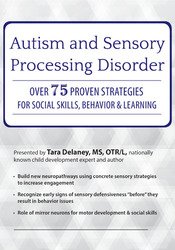Description
Presented by Tara Delaney, MS, OTR/L, nationally known child development expert and author
- Build new neuropathways using concrete sensory strategies to increase engagement
- Recognize early signs of sensory defensiveness "before" they result in behavior issues
- Role of mirror neurons for motor development & social skills
Watch this seminar and learn the sensory connection to behavior and learning struggles for kids with autism. You will leave with strategies to promote language, increase focus and expand play, as well as other creative ideas to design new and innovative techniques!
Early signs of sensory processing difficulties that may be linked to autism will be more recognizable. The latest brain research supports using sensory integration theory as a lens for viewing specific behavioral, learning and social challenges, such as:
- Inattention & increased distraction
- Difficulty with visual motor tasks
- Hitting self & others
- Escaping behaviors
- Extreme reactions to sensory input
Take home a toolbox full of sensory strategies to aid children with autism, and increase their success both academically and socially!
CPD
CPD
- PESI Australia, in collaboration with PESI in the USA, offers quality online continuing professional development events from the leaders in the field at a standard recognized by professional associations including psychology, social work, occupational therapy, alcohol and drug professionals, counselling and psychotherapy. On completion of the training, a Professional Development Certificate is issued after the individual has answered and submitted a quiz and course evaluation. This online program is worth 6.0 hours CPD for points calculation by your association.
Faculty
Tara Delaney, MS, OTR/L, is a nationally known child development expert who specializes in sensory processing, autism spectrum disorders as well as learning disabilities, specifically dyslexia. She is the author of three books: The Sensory Processing Disorder Answer Book (Sourcebooks, 2008), 101 Games and Activities for Children with Autism, Asperger’s and Sensory Processing Disorder (McGraw-Hill, 2009) and Building Social Skills for Autism, Sensory Processing Disorders and Learning Disabilities with Mary Hamrick (PESI, 2015).
She holds a Master’s of Science in Therapeutic Science from the University of Wisconsin-Madison. She is an international speaker and her Making Sense-ory® programs are in high demand throughout the United States. Ms. Delaney is the co-chief executive officer of School Steps, Inc. as well as co-chief executive director of ABA In Action. She is also the founder/executive director of Baby Steps Therapy.
Speaker Disclosures:
Financial: Tara Delaney is the co-CEO and co-owner of Temair Media. She is a published author and receives royalties. Tara Delaney receives a speaking honorarium, recording, and book royalties from PESI, Inc. She has no relevant financial relationships with ineligible organizations.
Non-financial: Tara Delaney is a member of the California Occupational Therapy Association and the American Occupational Therapy Association.
Objectives
- Assess how sensory processing, environmental and communication issues influence learning and behavior.
- Analyze the latest brain research on autism spectrum disorders and how these findings impact the way therapists and educators work with children/adolescence.
- Determine how early sensory-motor experiences are stored in the brain.
- Present the components of sensory integration and sensory processing difficulties common to children with a diagnosis of autism.
- Evaluate how early experiences may be perceived differently for children with autism due to brain differences.
- Ascertain how underlying sensory processing difficulties impact learning, behavior and social skills.
Outline
Sensory Processing Components and Strategies
- Vestibular
- Proprioception
- Tactile
- Visual
- Auditory
Autism: Concepts & Research
- Latest brain research
- Executive function
- Theory of Mind
- Central Coherence Theory
- Mirror neurons
Praxis (Motor Planning)
- Impact on those with autism
- Gross motor
- Fine motor
- Strategies for teaching new motor skills including activities of daily living
Strategies
- 0 to 3
- Non-contingent sensory diet
- Safe activities (e.g. bath time) to introduce new textures
- Preschool
- Sensory activities to expand play
- Sensory activities to promote language
- Early grades
- Sensory input to increase focus on a task
- Teach Change
- Middle school
- Sensory with executive function strategies
- Social sensory stories the student creates
- Case studies
Blending Strategies
- Incorporate sensory with Applied Behavioral Analysis
- Sensory paired with visual communication strategies
Target Audience
Counselors, Teachers/Educators, Occupational Therapists & Occupational Therapy Assistants, Psychologists, Social Workers, Speech-Language Pathologists and other Mental Health Professionals


